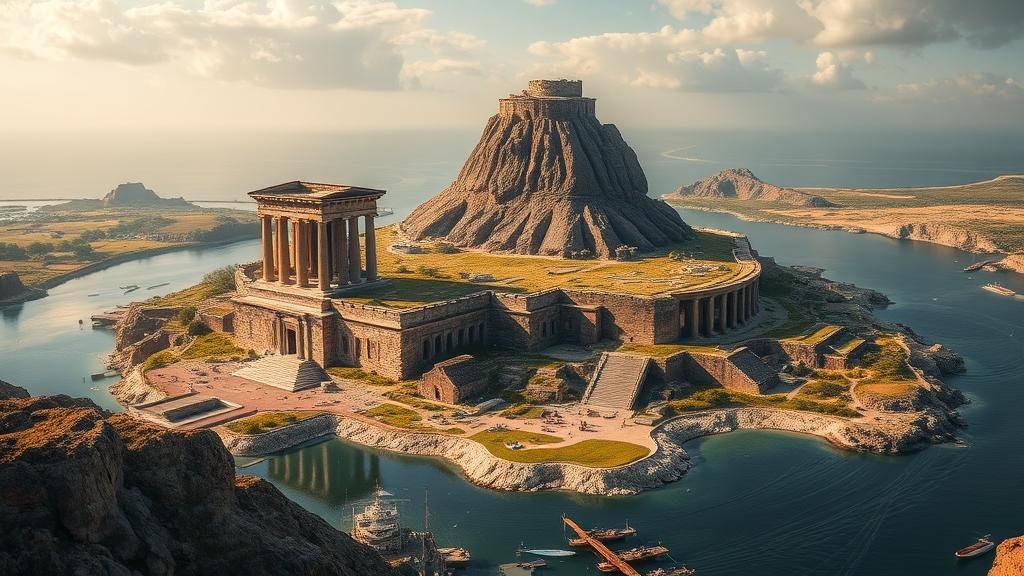Investigating the historical accuracy of Plato’s Atlantis and its possible locations.
Investigating the Historical Accuracy of Plato’s Atlantis and Its Possible Locations
Plato’s account of Atlantis has intrigued scholars, historians, and the general public for centuries. As described in his dialogues, Timaeus and Critias, Atlantis was a powerful and advanced civilization said to have existed around 9,000 years before his time, located beyond the Pillars of Hercules. With our continued fascination with the concept of lost civilizations, a critical investigation into the historical accuracy of Plato’s Atlantis and its potential locations is warranted.
Origins of the Atlantis Myth
The tale of Atlantis first appeared in 360 BCE, emerging from the philosophical writings of Plato. In these dialogues, Atlantis is depicted as an extraordinary island civilization that eventually succumbed to moral decay, leading to its downfall and submersion beneath the ocean.
- Plato presents Atlantis as a powerful naval force that attempted to conquer Athens but was ultimately thwarted.
- The civilization is described as technologically advanced, boasting impressive architecture and agriculture.
Platos philosophical goal was to illustrate the ideal state and the consequences of moral decay. So, while some elements may have historical roots, the account intertwines with mythological themes that challenge its credibility as a factual history.
Geographical Speculations
Several proposed locations for Atlantis have emerged over the years, each situated in regions rich with archaeological significance. Here are some prominent hypotheses:
- Crete: Some researchers suggest that the Minoan civilization, which flourished around 1700 BCE, serves as a basis for the Atlantis story due to its advanced society and sudden decline.
- The Azores: This archipelago, located in the North Atlantic, has been linked to various discourses around sunken continents, as it lies between Europe and the U.S.
- The Caribbean: Suggesting that a route from the Mediterranean could link to the Caribbean, some theorists propose that a now-sunken island in this region could be Atlantis.
- Antarctica: An eccentric theory posits that Atlantis could have been located beneath the ice, suggesting that preglacial civilizations could have thrived there.
Scientific Investigations and Archaeological Evidence
Despite the allure of these locations, definitive archaeological evidence for Plato’s Atlantis has not surfaced. Studies of the Mediterranean have yielded significant findings, yet none directly correlate to an advanced civilization as described by Plato. But, the search has fostered breakthroughs in understanding other ancient civilizations.
For example, exploration of the Minoan culture on Crete revealed:
- Remarkably sophisticated urban planning exemplified by the palace of Knossos.
- Extensive maritime trade routes indicating naval prowess.
Though a correlation between the Minoans and Atlantis is speculative, it underscores the necessity for a thorough investigation into historical narratives that might influence Platos fictional account.
Cultural Impact and Legacy
The tale of Atlantis has left an indelible mark on Western culture, inspiring a plethora of literature, art, and even scientific inquiry. As the concept transitioned from a moral lesson to a subject of quest and adventure, various adaptations arose:
- Literature: Novels such as Jules Vernes The Mysterious Island and the popular graphic novels exploring the lost city.
- Film and Media: Numerous movies have depicted Atlantis, sometimes with high fantasy elements, further romanticizing the myth.
- New Age Thought: Some groups continue to incorporate Atlantis as a symbol of spiritual and technological advancement.
These cultural interpretations depict Atlantis as a metaphor for human aspirations and failures, rather than a historical reality.
Conclusion and Actionable Takeaways
Ultimately, while the quest for historical accuracy in Platos Atlantis persists, tangible evidence remains elusive. narrative’s role as a philosophical illustration holds more weight than its historical claim. The investigation into historical accounts, set against archaeological scrutiny, encourages a deeper understanding of mankinds complex past. As we engage with these narratives, consider the following takeaways:
- Explore ancient civilizations rigorously and acknowledge overlaps with myth.
- Recognize the philosophical dimensions of historical tales, as they often reflect societal values.
- Engage with interdisciplinary perspectives, combining archaeology, literature, and philosophy to enrich understanding.
Plato’s Atlantis may remain a puzzle, yet its ongoing exploration continues to provide meaningful insights into our collective human history.


